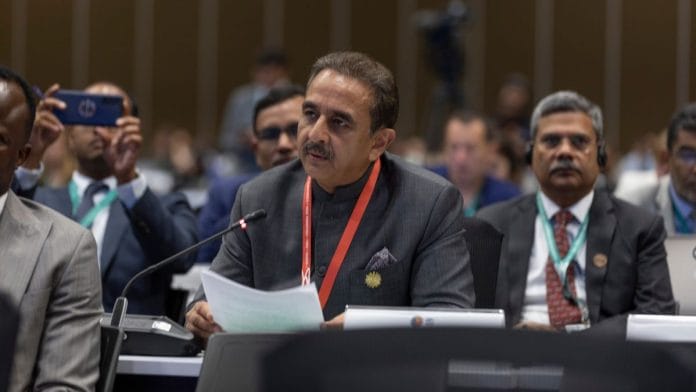New Delhi: At the plenary session of the 16th COP Convention on Biological Diversity (CBD COP16) Wednesday, India sought international finance to support the implementation of the country’s National Biodiversity Strategy. It is set to present an updated version of the action plan at the 10-day conference in Colombia.
Delivering India’s national statement at the UN conference, Union Minister of State for Environment, Forest and Climate Change Kirti Vardhan Singh, said, “A lot of ground needs to be covered in providing easily accessible means of implementation, i.e. financial resources, technology and capacity building needs with the requisite speed, scope and scale.”
India will present an updated version of its action plan, aligned with the Kunming-Montreal Global Biodiversity Framework, on 31 October, the minister said.
The Kunming-Montreal Global Biodiversity Framework, adopted at the CBD COP15 in 2022, lists 23 action-oriented goals that require urgent action by 2030 “to address the key drivers of biodiversity loss”. The implementation of these targets is required to achieve the long-term goals set for 2050 to safeguard biodiversity. Countries are required to give an update on how they are placed with their commitments.
The targets set for India include conserving 30 percent of its total area and ensuring the participation of indigenous people and local communities, as well as securing their justice and rights. Other targets also include preserving the rights of disadvantaged groups—women, local communities, people with disabilities and ground-level environmental activists, enabling sustainable consumption choices, and reducing food wastage.
In his speech, Singh also highlighted the significant steps that India has taken in global wildlife preservation by establishing the International Big Cat Alliance (IBCA), aimed at protecting the world’s seven major big cat species. He said the presence of these species was indicative of a rich and healthy biodiversity.
The ‘Namami Gange’ project, which was launched in 2014 to revive the riverine system and was recognised by the United Nations as one of the top 10 World Restoration Flagships that are restoring the natural world, also found mention in his speech on India’s efforts.
Had the privilege of delivering India’s national statement during the plenary session of UNCBD COP16 at Cali, Colombia. India has been at the forefront of taking initiatives, executing programs and fostering collaborations to conserve our rich biodiversity. Mission LiFE,… pic.twitter.com/YNV2Me69nw
— Kirti Vardhan Singh (@KVSinghMPGonda) October 30, 2024
India’s commitments
The Convention on Biological Diversity (CBD) has three main goals: the conservation of biological diversity, the sustainable use of the its components, and the fair and equitable sharing of the benefits arising out of the utilisation of genetic resources.
Towards this goal, it requires each member to develop an action plan to protect biodiversity based on national priorities. The 16th edition of the meeting of its member parties is currently being held in Cali between 21 October and 1 November.
Through the international forum, India has previously committed to integrating the values of biodiversity preservation at a decision-making level. India aims to reduce pollution, nutrition loss, pesticide risk, and the number of invasive species by at least 50 percent in the coming years.
“I would like to end by reiterating India’s commitment towards protecting its own as well as global biodiversity for the present and future generations, in the true spirit of Vasudhaiv Kutubakam—One Earth, One Family, One Future,” Singh said.
(Edited by Sanya Mathur)






